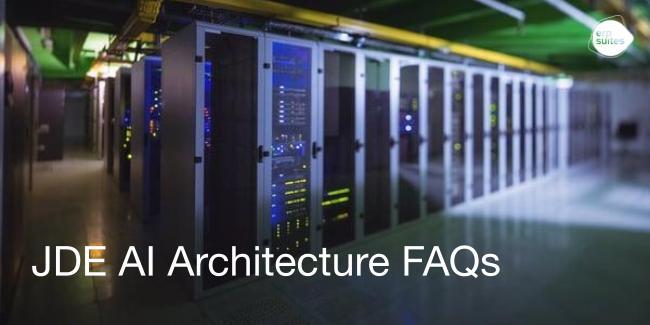Choosing the Right Cloud for JD Edwards: Public, Private, or Hybrid?
May 21st, 2025
3 min read
In this episode of "Not Your Grandpa’s JD Edwards," host Nate Bushfield discusses critical insights for selecting the right cloud model for JD Edwards ERP systems with Stuart Peterman, a cloud strategy expert from ERP Suites. They explore public, private, and hybrid cloud options, highlighting the benefits, challenges, and essential considerations, including security, compliance, cost, and complexity. Stuart emphasizes the importance of clearly defining business priorities and strategies before making cloud migration decisions. This comprehensive discussion provides actionable guidance for businesses navigating cloud migrations and managing enterprise applications.
Table of Contents
-
Introduction: Public vs. Private vs. Hybrid Cloud
-
Common Mistakes in Choosing a Cloud Model
-
Understanding Public Cloud Benefits
-
Private Cloud: Control and Challenges
-
Hybrid Cloud: Complexity vs. Flexibility
-
How to Decide the Right Cloud Model
-
Importance of MSP Certification
-
Next Steps: Evaluating Your Cloud Strategy
Introduction: Public vs. Private vs. Hybrid Cloud
What's the real difference between public, private, and hybrid cloud? How do you know which model is the best fit for your business?
Today on Not Your Grandpa's JD Edwards, we'll break down the pros and cons of each model, how they impact security, cost, and performance, and the key factors that every business should consider before migrating.
By the end of this episode, you'll have a clear framework to confidently choose the right cloud model for your JD Edwards system and enterprise applications.
Welcome to Not Your Grandpa's JD Edwards, the podcast where we take a modern, no-nonsense approach to enterprise technology. I'm Nate Bushfield, and today we're talking about one of the biggest IT decisions companies face: choosing the right cloud model. To help us navigate this, I'm joined by Stuart Peterman, a cloud strategy expert who has guided numerous businesses through successful JD Edwards migrations without running into performance, compliance, or cost issues.
Stu, how are you doing today?
I'm doing great, Nate. Thanks for having me.
Common Mistakes in Choosing a Cloud Model
Migration is a huge decision, but most businesses struggle with where to start. Like what happens if you choose the wrong model? Can public cloud really handle ERP workloads securely? Is private cloud just an expensive legacy approach? Is hybrid cloud the safest bet or just the most complex?
Stu, in your experience, what are the biggest mistakes companies make when deciding their cloud model?
Yeah, thanks, Nate. The biggest mistake companies make is not understanding their internal priorities, not having a set strategy, and not understanding the benefits of public, private, or hybrid cloud scenarios.
Understanding Public Cloud Benefits
What doors does the public cloud open for companies? What applications, products, and services do they now have access to?
There are many services you can take advantage of. AWS has Sagemaker, Oracle has their AI offering, Autonomous Data Warehouse, Autonomous Database, and incredible analytics and business intelligence tools.
Public cloud gives businesses access to real-time dashboards and insights directly integrated into legacy ERP systems, significantly boosting productivity and reducing report generation times from minutes to seconds.
Private Cloud: Control and Challenges
Private cloud can be described two ways. Larger companies might own and manage their own data centers. Other companies outsource to a managed service provider. Both offer significant control, essential for compliance and security requirements.
However, private cloud environments typically have higher costs and slower resource deployment compared to public cloud.
The human capital required for managing these environments adds additional complexity, cost, and operational demands.
Hybrid Cloud: Complexity vs. Flexibility
Organizations sometimes have sensitive workloads they're uncomfortable hosting entirely in public cloud. Hybrid cloud splits workloads between private or on-premises environments and public cloud, balancing compliance, control, and performance.
But this introduces significant complexity—managing multiple vendors, contracts, and skillsets. Monitoring performance and cost becomes challenging, often increasing administrative overhead significantly.
Hybrid cloud makes sense for specific high-stakes compliance or governmental scenarios, but managing such environments is difficult and costly.
How to Decide the Right Cloud Model
So how should businesses really decide between public, private, or hybrid cloud, and what are key questions they should ask?
Ask yourself about risk tolerance and compliance requirements first. Consider long-term goals and the innovative services offered by public clouds, such as advanced analytics and AI capabilities. Cost savings might be an additional benefit, though it should never be the primary driver.
If you value control and security, private cloud might fit better. Hybrid models can provide flexibility but at increased complexity.
Third-party assessments from experienced consultants can greatly simplify decision-making, identifying the best fit for your business's unique needs.
Importance of MSP Certification
Who's managing your cloud environment matters significantly. ERP Suites recently achieved Oracle’s Cloud Managed Services Provider (MSP) certification, meaning they underwent rigorous auditing and validation by Oracle and third-party auditors to demonstrate best practices in cloud management.
Achieving MSP certification ensures ERP Suites has proven capability to build, deploy, manage, and secure Oracle cloud workloads with expert resources and reliable documentation and practices.
Next Steps: Evaluating Your Cloud Strategy
So after watching this episode, what should businesses do next? How can they learn more?
ERP Suites offers a comprehensive cloud assessment framework. This detailed, week-long assessment covers all organizational aspects: security, compliance, finance, performance, scalability, and more. Businesses receive extensive findings to guide their strategy, whether migrating now, later, or deciding not to migrate at all.
Interested businesses can also schedule a free consultation directly on ERPsuites.com to explore these options further.
If this episode helped you think differently about cloud migration, subscribe, share with your team, or schedule that free consultation. For questions about Oracle Cloud MSP providers, connect with ERP Suites on LinkedIn or at ERPsuites.com.
We'll see you next time.
Video Strategist at ERP Suites
Topics:


